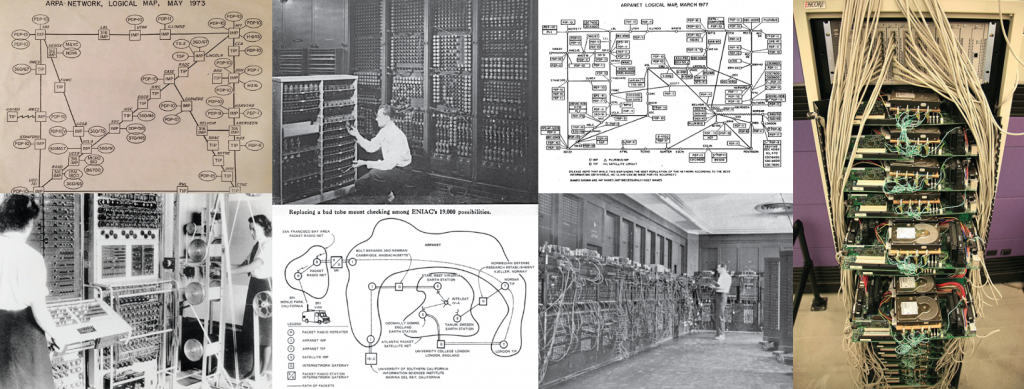During the height of the Cold War in the 1960s nuclear paranoia was at an all time high.
I remember those scary “duck and cover” drills we had to do in the classroom.
The U.S. government was scared too…in the event of a nuclear attack we had no system set up to communicate and disseminate vital information.
Back then computers were large, immobile, and unconnected. To access information stored on one computer, government workers had to use that computer itself.
What was the solution? The U.S. Defense Department created ARPANET (Advanced Research Projects Agency Network). It was the first version of the Internet used solely by the government.
By the early 1970s private companies started creating their own internal networks, and when the personal computer industry began in 1977, visionaries of the time recognized the possibilities of being able to share data and communicate computer to computer.
TheTransfer Control Protocol/Internetwork Protocol (TCP/IP) was created as a solution to make this a reality.
ARPANET officially switched to the TCP/IP standard on January 1, 1983, which is now widely considered to be the birthday of the Internet.
But the Internet of the 1980s was limited to communication. There was still no way to locate and retrieve information.
That all changed on September 10, 1990, when the first publicly accessible search engine, Archie, debuted. The name came from the word “Archive” without the letter “v.”
Archie was short-lived, followed by search engines Aliweb and JumpStation in 1993, and WebCrawler and Lycos in 1994.
The first popular search engine, Yahoo! Search, launched in 1995, and a slew of competitors were soon to follow: Magellan, Infoseek, Excite, and AltaVista were just a few.
Now people could search for information on the World Wide Web, but there was still a problem…search engines didn’t “rank” the importance and pertinence of search results.
These early search engines delivered results based on how many times a particular searched word or phrase appeared on various web pages.
For instance, if you searched the term “real estate,” the engine simply retrieved web pages that contained that term the most times.
This made it easy for content providers to “game the system” by inserting unreasonable amounts of key terms in articles, and made it difficult for users to conduct relevant Web searches.
What should have been intuitive and user friendly was actually tedious and time consuming. Consumers demanded better.
In 1996 two Stanford PhD students, Larry Page and Sergey Brin, had an idea for their research project based on an algorithm they called PageRank.
Put simply, “PageRank is a way of measuring the importance of website pages…it works by counting the number and quality of links to a page to determine a rough estimate of how important the website is. The underlying assumption is that more important websites are likely to receive more links from other websites.”
They originally named their new search engine BackRub because it referenced “backlinks” to determine the importance of a site. A backlink is simply a link from one website to another.
They eventually changed the name to Google, a play on the word googol, which is the mathematical name for the number 10 to the 100th power (1 followed by 100 zeroes), because the search engine could retrieve incomprehensible amounts of information.
The domain name www.google.com was registered on September 15, 1997, and the company was incorporated on September 4, 1998.
Since then Google has further improved search relevance by creating a complex algorithm that measures numerous other factors in determining what you’re looking for and making sure you can access it.
Page and Brin’s brainchild has increasingly dominated the global search engine space, with a remarkable 92% market share as of June 2021.
Tech experts say Google has remained at the top because it “started strong and just kept getting better.”
Perhaps the greatest indicator of Google’s success is the fact that the name itself has become a common verb most people use every day. Kleenex is to tissues as Google is to Web search.
We “Google” information like we now “Zoom” with someone or “Uber” out to dinner.
ARPANET was invented out of a need for government communication after a nuclear attack.
TCP/IP was created out of a need for interconnectivity between multiple networks.
Google was born out of a need for more relevant Web searching.
This is more than a story about Google and the Internet. It’s about not being satisfied with what was and being obsessed with what could be. In the words of Francis of Assisi:
“Start by doing what’s necessary, then do what’s possible…and suddenly you are doing the impossible.”












